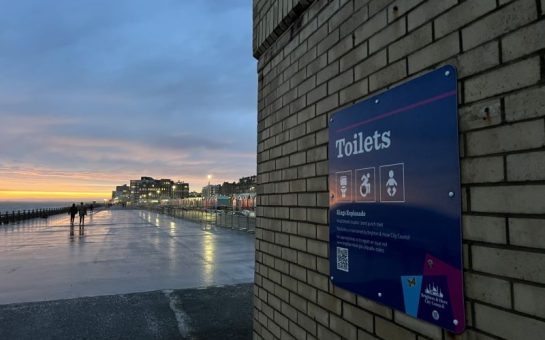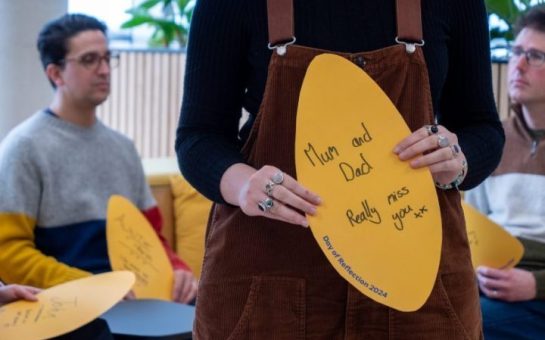The Windmill Brixton, which pioneered a generation of raucous and youthful guitar music, faces permanent closure because of COVID.
Brixton post-punks Shame, who held a residency at the Windmill whilst still at school, made the top ten for the first time this week with their James Ford-produced sophomore album Drunk Tank Pink.
In December the Windmill required a £10,000 cash injection from the Music Venue Trust (MVT) after being denied a slice of the Government’s £1.57billion Culture Recovery Fund.
Shame frontman Charlie Steen, 23, said: “I can’t imagine Shame existing without the Windmill. It pretty much means everything, it’s the perfect realm.
“It was where we were able to hone the craft of live performance; where we were able to test out new material because that second gig when you’ve got four songs, you are not going to be playing Brixton Academy!
“The Windmill was a myriad of creative accessories that all came together and allowed us to propel ourselves forward.
“Everything creative needs a breathing space and a breeding place and that’s what it offered. Its necessity is unequivocal to everything else.”
In November, the MVT – a trust representing hundreds of UK grassroot venues – named the Windmill as one of six London venues facing imminent closure after it was denied government funding due to its status as a sole trader rather than a limited company.
Shame responded by auctioning off goods and services in hope of saving the venue.
Steen offered to paint ‘any image of your desire’, guitarist and culinary aficionado Eddie Green, 24, provided Zoom cook-alongs, and drummer Charlie Forbes, 23, and bassist Josh Finnerty, 23, promised to write personalised songs.
Six years previous Shame ran their own regular night at the Windmill and often on the bill would be Goat Girl, who follow up a critically acclaimed self-titled debut with On All Fours next Friday.
To Goat Girl singer Lottie Pendlebury, 24, the Windmill was the first venue that provided a band of three female guitarists and a non-binary drummer with a ‘safe space’ to perform.
Pendlebury said: “The venue is going to welcome you and isn’t going to judge you for who you are.
“If you are marginalised for your gender or your sexuality, or even your race, those safe spaces become more important than ever in enabling you to platform your art, and without those venues you lose potential future bands.
“Before the Windmill, we would play open mics where we would receive hurls of misogynistic abuse because of the cis, heterosexual, white, male arena we were in. It’s just not a comfortable experience.
“The first time I visited it was a big wake-up call. Before that music never felt like it could be achievable.
“It was also my first experience of seeing really messy, loose music that was sung by drunk people. They weren’t musically trained. It was more about having fun.
“We realised we didn’t need to be virtuosic musicians. We can just get together, have fun and potentially play at the Windmill.”
As Goat Girl and Shame graduated from playing independent venues, a new crop of rousing and frenzied talent followed in their wake.
Since 2018 Black Country New Road, Squid, and Mercury nominees Black Midi have all emerged from the Windmill stage.
Folly Group seem to be next in line, having released singles ‘Butt No Rifle’ and ‘Fewer Closer Friends’ to much acclaim in 2020 and been included on this year’s coveted NME Ones to Watch list.
But before their debut releases the Windmill allowed the band to play practice gigs in secret for a year.
Folly Group guitarist Louis Millburn, 24, said: “We were only able to do that because the Windmill let us. You’re not really good until you’ve played around 50 odd shows together.
“When you make mistakes in private, they don’t really matter but when you make mistakes on a stage you really learn from them and being afforded the luxury to make mistakes in such a hallowed place really teaches you to get better.
“I think we’re only just starting to get it right now, which is down to that stage.”
Once christened as Folly Group, the band managed to stir media attention and build industry bridges before the first wave of COVID struck.
But with fewer independent venues, the next wave of acts may not be afforded the same luxury.
Milburn said: “For us, the people that surround the Windmill are so supportive.
“They are always organising cool things to get involved with so despite not being able to play shows, by osmosis we’ll pick up some traction by being around wonderful supportive people like that.
“But if I was starting now, I wouldn’t take the course of live music at all. It is an industry that has received no support and been put out to pasture by the Government.
“I love music and I’m obsessed with it but I don’t think I would be putting as much life into it as I do.”
You can read more about the campaign to save the Windmill here.
Featured image credit: Holly Whitaker




